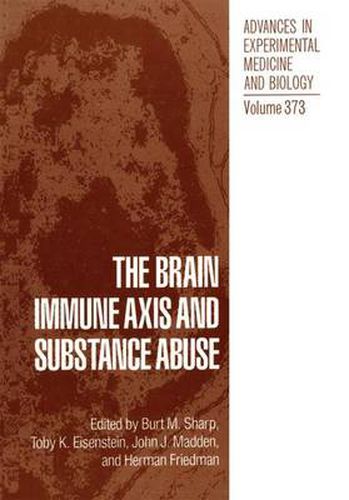Readings Newsletter
Become a Readings Member to make your shopping experience even easier.
Sign in or sign up for free!
You’re not far away from qualifying for FREE standard shipping within Australia
You’ve qualified for FREE standard shipping within Australia
The cart is loading…






This title is printed to order. This book may have been self-published. If so, we cannot guarantee the quality of the content. In the main most books will have gone through the editing process however some may not. We therefore suggest that you be aware of this before ordering this book. If in doubt check either the author or publisher’s details as we are unable to accept any returns unless they are faulty. Please contact us if you have any questions.
This volume represents the proceedings of the 2nd annual symposium on the Brain Immune Axis and Substance Abuse held at the Breakers Hotel in Palm Beach, FL in June 1994. The history of productive studies concerning the relationship between the nervous and the immune systems is relatively recent. Studies on the effects of drugs of abuse on the immune system and on infections among individuals who abuse drugs are also of recent vintage. Only in the last decade have investigators begun to describe the role of drugs of abuse and their endogenous counterparts on the brain-immune axis. Thus, the involvement of the neuroendocrine system in the interactions of drugs of abuse and the immune system has only recently been appreciated. In addition, it has been recognized that direct neural inputs impact immune function. Given the complexity of these interactions, characterization of biologically significant phenomena and elucidation of their mechanisms of action often requires a multidisciplinary approach. This meeting, on which the chapters in this book are based, brought together scientists from an array of biomedical disciplines whose work is focused on the effects of drugs of abuse on the neuro-endocrine immune axis. The meeting was unique in focusing on the brain-immune axis from the viewpoint of drugs of abuse rather than either immunity itself or the brain itself. Presentations addressed the direct effects of drugs of abuse on various components of the immune system, as well as those mediated indirectly by the central nervous system and the neuroendocrine system.
$9.00 standard shipping within Australia
FREE standard shipping within Australia for orders over $100.00
Express & International shipping calculated at checkout
This title is printed to order. This book may have been self-published. If so, we cannot guarantee the quality of the content. In the main most books will have gone through the editing process however some may not. We therefore suggest that you be aware of this before ordering this book. If in doubt check either the author or publisher’s details as we are unable to accept any returns unless they are faulty. Please contact us if you have any questions.
This volume represents the proceedings of the 2nd annual symposium on the Brain Immune Axis and Substance Abuse held at the Breakers Hotel in Palm Beach, FL in June 1994. The history of productive studies concerning the relationship between the nervous and the immune systems is relatively recent. Studies on the effects of drugs of abuse on the immune system and on infections among individuals who abuse drugs are also of recent vintage. Only in the last decade have investigators begun to describe the role of drugs of abuse and their endogenous counterparts on the brain-immune axis. Thus, the involvement of the neuroendocrine system in the interactions of drugs of abuse and the immune system has only recently been appreciated. In addition, it has been recognized that direct neural inputs impact immune function. Given the complexity of these interactions, characterization of biologically significant phenomena and elucidation of their mechanisms of action often requires a multidisciplinary approach. This meeting, on which the chapters in this book are based, brought together scientists from an array of biomedical disciplines whose work is focused on the effects of drugs of abuse on the neuro-endocrine immune axis. The meeting was unique in focusing on the brain-immune axis from the viewpoint of drugs of abuse rather than either immunity itself or the brain itself. Presentations addressed the direct effects of drugs of abuse on various components of the immune system, as well as those mediated indirectly by the central nervous system and the neuroendocrine system.